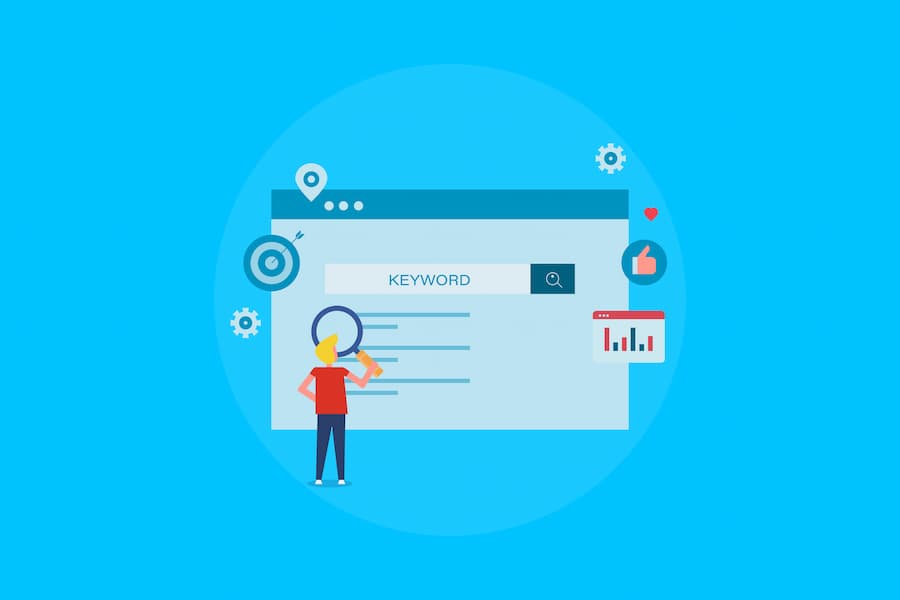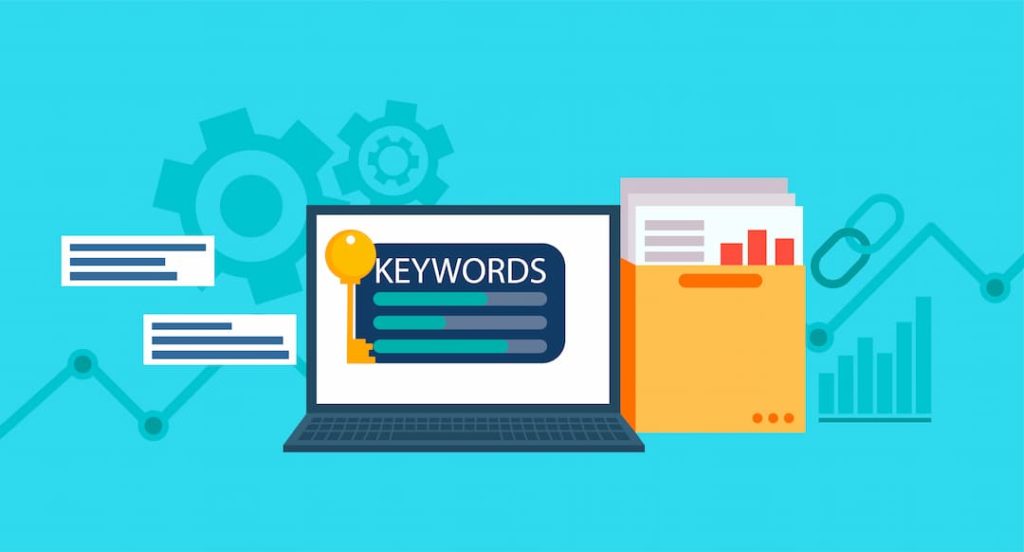The Very Foundation Of SEO, Web Copywriting & Hierarchical Content Structure Is Keyword Research
Keywords, longtail keywords and semantic expressions are fundamental to the success of SEO campaigns and paid advertising. Keywords are terms with significance and relevance to your business, services or products. In total, there are nine different types of keywords.
Our SEO technicians at Search4Local (Exeter’s leading SEO specialist and digital advertisement company) use sophisticated keyword research software that enables us to use search engines in reverse. Showing us how your potential customers use search engines to find businesses like yours. Geolocation can affect this terminology, and even spelling in some cases. This is why, if you’re doing a local SEO project, you complete geo-specific keyword research.

If you are new to the world of SEO, and if you take nothing else away from this blog than this next point, please remember. Brand names and brand messages are not necessarily keywords.
That’s not to say that your brand name or brand message is not important to your SEO campaign. It’s more to say, you’re better to weave brand messages into your content. Leaving the powerful hierarchal sections of your website, like the H1 on your homepage, for keywords.
This is fully dependent on the popularity and awareness of your brand. For example, let’s pretend that KitKat are not a well-known brand, and their brand message is practically unheard of. It would be far more beneficial for their SEO campaign to focus on keywords like ‘chocolate biscuit’ This practice is called pairing keywords with brand.
Users don’t search for ‘have a break’.
They search for KitKat. So, if KitKat was not as popular as it is, we would consider optimising the content for chocolate biscuits or similar.

The Nine Different Types Of Keywords
Without the right keywords, it’s questionable that there is even an SEO project at all? There are nine different types of keywords in total. Please see a brief description below:
Short-tail Keywords
As the name suggests, short-tail keywords are made up of three words or less. They can also be referred to as head keywords, and tend to attract a huge amount of search volume. Where users are concerned, they tend to be how users start researching a topic. They tend to be difficult to judge user intent. Let’s give an example, ‘cake’. Users could be looking to purchase cake, find out how to bake a cake, or how many calories are in a cake.
Long-tail Keywords
Long-tail keywords consist of more than three words and tend to be more specific than short-tail ones. Traffic wise, they get less traffic and tend to be easier to win SERPs for as the competition is less.
Short-term fresh keywords
When we think of fresh keywords, we think about an event or product that receives a lot of attention and hype quickly. For example, a popular film, developing news story or event will receive a huge amount of attention and traffic for a very short time, and then almost none afterwards. You can use these types of keywords to win organic traffic, but expect to see a steep drop quickly.
Long-term evergreen keywords
Evergreen keywords are search terms which remain relevant all of the time. Popularity can fluctuate but you never see extreme drop in traffic. The benefit here is from the moment you publish a piece focusing on evergreen keywords, you know there will be users searching and wanting to read the piece.
Product defining keywords
These are keywords that describe or explain products in their most simple form. Users that are searching for specific products use niche search terms as they tend to know exactly what they want. Making product defining keywords valuable, and expensive if you’re running a PPC campaign. When a user searches in products, they tend to be at the early stages of purchasing. Making these search terms, in a commercial sense, exceptionally valuable.
The most beneficial way to target products is to add detailed descriptions and brand names to products. Especially if you’re a third- party reseller of a product. For example, let’s say you run an online music shop specialising in drum equipment. A drummer may know the exact new cymbal they want to purchase, from a specific manufacturer. The product keyword would be Istanbul Agop Signature 23” Ride Cymbal. This is how it breaks down:
Brand = Istanbul
Product = Agop Signature
Keyword = 23” Ride Cymbal
Customer defining keywords
Customer defining keywords are your targeted persona. If you don’t have one, it would be a good idea to create an imaginary profile as a target audience.
Ask yourself the following questions. Are they male? Are they female? Where do they live? What is their job and average salary / internet use / preferred ways of searching and which device? You would be surprised just how much a difference this can make, especially when you relate this to your target market.
It’s very possible that a female in their early twenties living in Edinburgh uses the internet and searches differently then a male living rurally in Cornwall in their fifties.

Geo-targeting keywords
Geo-targeting relates to local SEO and area targeting. Allowing local businesses to appear in their local SERPs. This is especially useful for smaller and local business wanting to expand into more affluent areas close by.
Geo-specific keywords are one of the easiest to target. What’s more, if you already have an address visible on your website, you’re part way there, or better still have your Google My Business listing linked, this helps tell algorithms exactly where your business is based.
A crucial factor to remember is hierarchical structure, and when you should use geo locations and when you shouldn’t. Geo locations can be paired with long-tail phrases and semantics. Too many locations and you are in danger of keyword stuffing.
LSI keywords
LSI (latent semantic indexing) are thematic phrases that are closely related to your main keyword.
Again, let’s go back and use our drummer wanting to find new parts for his drum kit, but this time he has spare cash but doesn’t know what he wants to buy. The user intent changes, and so does the keywords he uses. For example:
Drum kit – Main Keyword, short-tail & Long-term evergreen
Percussion instruments – percussion instruments for drum kits
Types of drums – snare drums – brands of snare drum
LSI keywords tend to have low competition and work well for content strategies and internal link building.
Intent targeting keywords
When a user searches a query, intent falls into three categories. This is because users want general information on a specific items and topics. Intent targeting keywords tend to appear in informational contents, aiming to educate the reader. For example:
What Is are Vanilla Pods?
How Do Vanilla Pods Grow?
What To Look For When Buying Vanilla Pods?
To Geo Locate, Or Not?
Learning when and where to use geo locations in keywords relates to content structure, user intent and type of keyword. There are designated places in a website that are best to position your keywords, as a rule of thumb our SEO copywriters produce copy for users first and search engine algorithms second.
If you are carrying out a local SEO strategy for a business targeting a specific area, geo specific keywords are going to help you win page one SERPs quickly, and map pack listings as there is a link between your Google My Business and website.
It is also important to include mentions of geo locations in meta data, title tags, SEO titles and certain headings.
Different Tools For The Job

Long Form Content & SEO
Long-form content is anything with a word count of more than seven hundred700 words for the main site. Anything over one thousand five hundred1500 words is long form content for blogs and case studies. Search engines prefer long-form as it tends to be more detailed.
Long-form content should develop when there is a need for it. Increasing wordcount by repeating yourself is bad for SEO. Having a larger word count full of related and relevant details is good for SEO.
Keyword Stuffing
Keyword stuffing can happen by accident but is nonetheless black hat SEO. It relates to keyword density, the number of mentions and where the keyword is positioned. There are theories and studies into using multiple keywords (more than two) in a single piece of content, including semantics, and analysing how this affects ranking.
Keyword stuffing is hugely dependent on the length of the content. Long-form content, like this blog, will naturally have more mentions.
Frequently Asked Questions
Finding the best keywords is a by-product of understanding the aims and objectives of a website, industry, and the type of clients or enquiries needed. We use the latest software to get accurate geo specific keyword data. Programs like Google Keyword Planner, Ubersuggests & Semrush to name a few.
Keyword research is very important for SEO, paid ads and digital marketing as a whole. Entire campaigns are based on the reliability of data we gather. Think of keywords as the foundations of house, where the structure is built.
Keyword density is a term used to measure the percentage or number of specific keywords, semantics or longtails in a single page. There is a happy median relating to hierarchical content structure you need to hit to be as effective as possible.
Hierarchical content structure is a way of mapping content, including main site content and blogs. It ensures the most important and relevant information is given priority positioning, for both users & search bots to crawl. Think of it as a flow chart, with the most important content of highest SEO value sitting at the very top before expanding.
Keywords are best positioned in on-page content, slugs, metadata, SEO titles & anchor links. Remember that relevance is key and too many mentions could be seen as keyword stuffing, which is detrimental for SEO.
Measuring Success & Seeing Results
Get More Organic Traffic To Your Website
To find out further details on keyword research and to start beating your competition online, please get in touch with us. Our in house digital marketing team consists of SEO technicians, copywriters, website designers, front end developers & paid advertising experts.
Call us today on 01392 409159 or email customerservices@search4local.co.uk.




